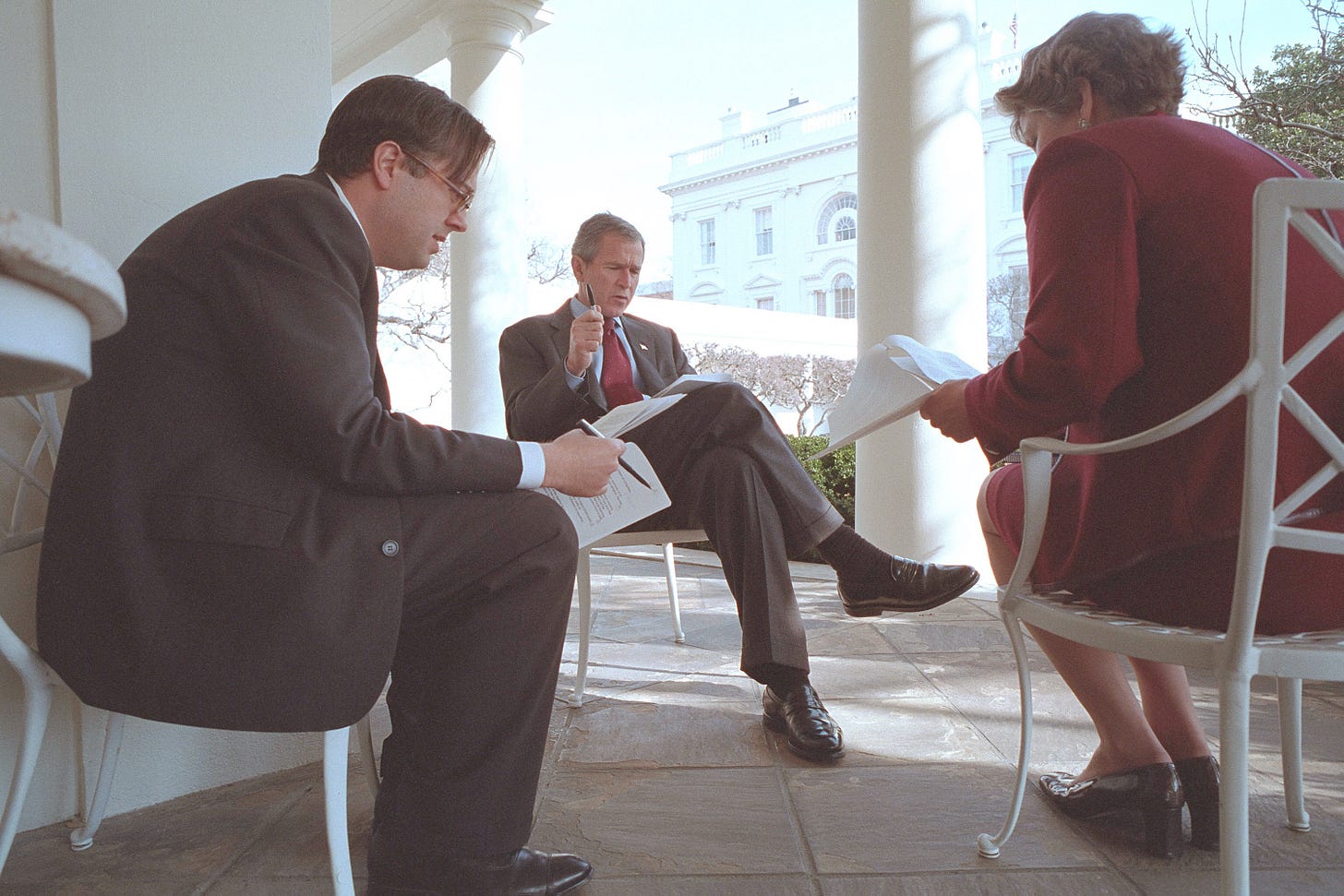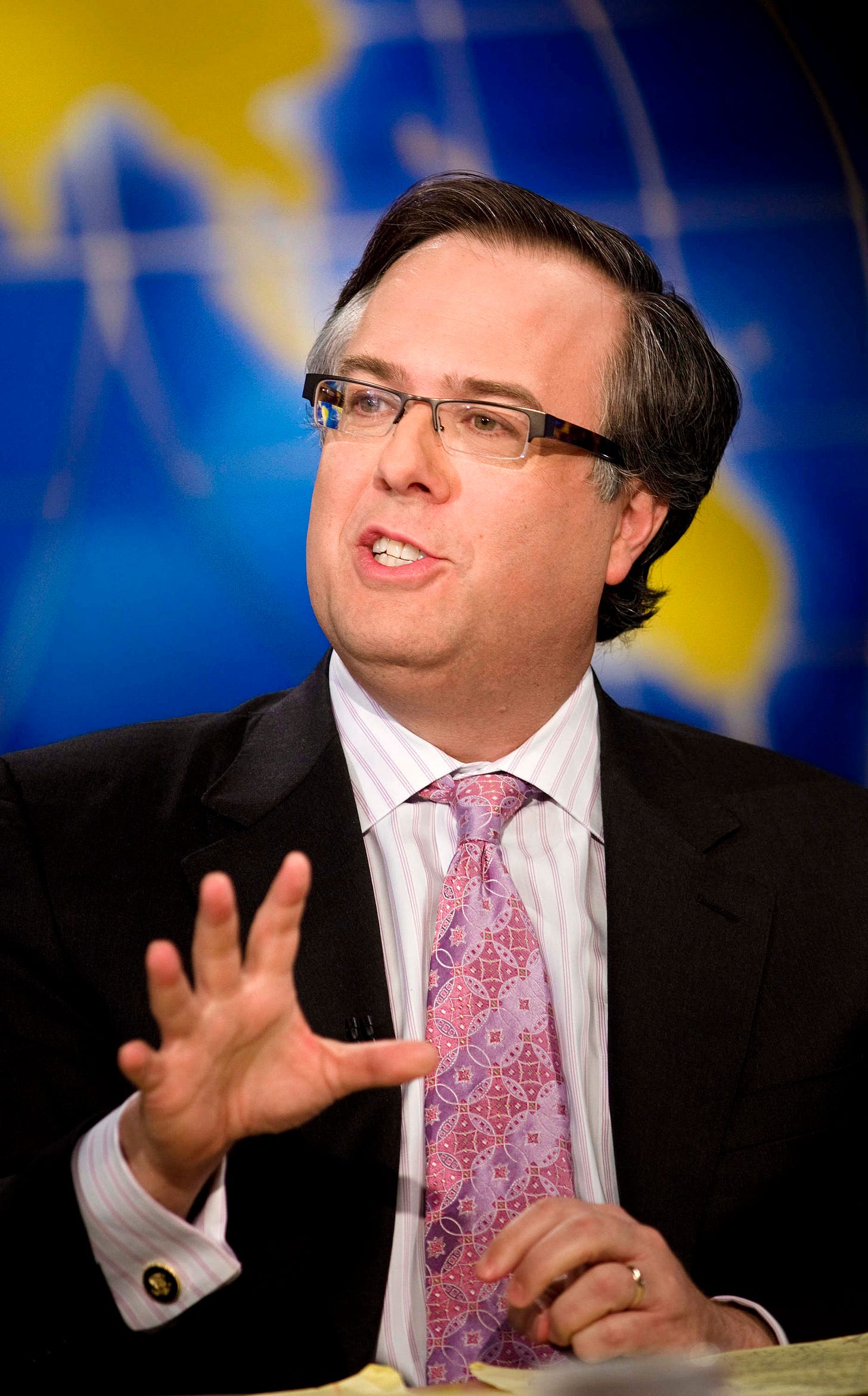An appreciation and remembrance of Michael Gerson, a man of his words
He offered the nation a truly prophetic voice that we will sorely miss, but will live on through his masterfully crafted words.
Michael Gerson died on November 17 from complications related to cancer. He was only 58 years old, and his untimely death is a national loss and a personal one for those of us who knew him.
Gerson came from conservative white evangelical Christianity. But, because of his head and heart, he was one of the deepest critics of the right-wing, populist, racialized and autocratic movement that threatens our democracy and the integrity of evangelical faith itself.
Michael Gerson, as they say, had a way with words. After graduating from the Wheaton College he became a writer for conservative leaders and causes, including former Watergate felon Charles Colson, who became a Christian and prisoner advocate. Gerson eventually emerged as the chief speechwriter for President George W. Bush, whose faith was also important to him, then grew to be an influential and substantial policy advisor.
After the Bush presidency, Gerson became a regular columnist for the Washington Post. For him, it was moral language — battles between good and evil, light and darkness —that drove his writer's imagination. That came directly from his personal faith.
“It is a real mistake to try to secularize American political discourse,” he told NPR in 2006. “It removes one of the primary sources of visions of justice in American history.”
I have a vivid memory of meeting Mike when George W. Bush invited thirty faith leaders to Texas, including some he knew had not voted for him. The topic was poverty and the new President’s idea of a faith-based initiative and office in the White House. Bush mostly asked for advice. He said to me, “I am a white Republican who just doesn’t get poverty. How do I do that?” I replied that he needed to listen to poor people and those who lived and worked with people at the bottom of society. “Gerson,” he shouted out, and Mike came over to join our conversation.
After they came to Washington, I went to the White House for several meetings with the new “compassionate conservatives” in the administration – of which Gerson and Bush turned out to be among the very few. We kept talking until the outset of the war in Iraq, when I was one of the first faith leaders to come out against it. But Mike and I remained in contact.
In 2009, as America was still reeling from fallout of the 2008 housing collapse, I partnered with Mike to found the Poverty Forum, which convened leaders and policy experts representing divergent political perspectives but sharing biblical values surrounding God's concern for the poor. We released a set of bipartisan policy recommendations for poverty alleviation. These policies were given to the newly inaugurated Obama White House and to Congress to encourage them to seek bipartisan solutions to eradicate poverty.
Mike was an architect of what he and others hoped would be a new movement of compassionate conservatism that would soften and open Republican politics to people and ideas that were not included in their political ideology.
“That’s a different kind of conservatism,” he told the PBS show “Religion and Ethics Newsweekly” in 2007, “a conservatism of the common good that argues that we need to orient our policies towards people that might not even vote for us.”
But when Trump and Trumpism rose and took over the Republican Party, Gerson found himself on the outside of his party looking in. We often spoke of how he felt “politically homeless.” Trump's lies, infidelities, lack of character, racial language, and the casting off of the marginalized were being set aside in a series of political trade offs and Faustian bargains between white evangelicals and political power. Being alienated from his former political party and conversative movement caused deep and lonely feelings for Gerson.
Mike wrote me an email last August, which said, in part:
Dear Jim,
Just a heads up. I have a big essay on faith and politics — more than 4,000 words — going up online at the Post tomorrow. It compares the anti-elitist Jesus movement of 1st century Palestine to the right wing populism of today. In a high stakes cultural conflict between Hellenism and Judaism, Jesus presented a kind of hope that rejected violence, nationalism and militancy and sought to implant a different way of living on the earth. I figured that I should try to get to the crux of the matter while I still feel up to it.
It is the most forthright Christology I have ever offered in the Post, aside from some holiday writing. And I am grateful to the Post opinion leadership that allowed and encouraged it. (So much for our anti-Christian media.)....
This is not so much a closing statement as a summary statement–trying to put down the arguments that I have been trying to make (often haltingly and unsystematically since 2015) ….
The article is likely to be drowned in the vast media ocean in a day or two. But I hope some people will engage the arguments I make after the normal expiration date of a column.
Michael Gerson was gifted in getting to “the crux of the matter.” His was the most extraordinary essay, by anyone so far, that has been written about the depth of the anti-Christian nature of right wing populism and its White Christian Nationalism. I commend it all to you, but here are several key excerpts:
Leaders in the Republican Party have fed, justified, and exploited conservative Christians’ defensiveness in service to an aggressive, reactionary politics. This has included deadly mask and vaccine resistance, the discrediting of fair elections, baseless accusations of gay “grooming” in schools, the silencing of teaching about the United States’ history of racism, and (for some) a patently false belief that Godless conspiracies have taken hold of political institutions.
But the credibility of religious conservatives is undermined by the friends they have chosen to keep. Their political alignment with MAGA activists has given exposure and greater legitimacy to once-fringe ideas, including Confederate nostalgia, white nationalism, antisemitism, replacement theory and QAnon accusations of satanic child sacrifice by liberal politicians.
…
Christ’s revolt against the elites could hardly be more different from the one we see today. Conservative evangelicalism has, in many ways, become the kind of religious tradition against which followers of Jesus were initially called to rebel.
Woe to evangelical exclusion. In their overwhelming, uncritical support of Trump and other nationalist Republicans — leaders who could never win elections without evangelical votes — White religious conservatives have joined a political movement defined by an attitude of “us” vs. “them,” and dedicated to the rejection and humiliation of social outsiders and outcasts. From the start, the Trump-led GOP dehumanized migrants as diseased and violent. It attacked Muslims as suspect and dangerous. Even when evangelical Christians refuse to mouth the words of racism, they have allied themselves with the promoters of prejudice and white grievance. How can it be that believers called to radical inclusion are the most hostile to refugees of any group in the United States? How can anyone who serves God’s boundless kingdom of love and generosity ever rally to the political banner “America First”?
What brought me to consider these historical matters is a disturbing realization: In both public perception and evident reality, many White, conservative Christians find themselves on the wrong side of the most cutting indictments delivered by Jesus of Nazareth.
I was also deeply moved by one of Mike’s columns on race. In October, near the end of his life, he dealt directly with the topic of racism that many white evangelicals continue to minimize or ignore. Here is what he wrote:
This is among the worst errors of moral judgment I have made as a columnist. I tended to view bigotry as one of America’s defects or failures. The historical works I read often tried to defend the best elements of the American ideal as dramatically outweighing the worst moments of its application.
But no: The country was soiled by the sin of slavery from its birth. Many White people became wealthy by systematically stealing the wages and wealth of their Black neighbors. White Americans established a social and religious system designed to grant themselves dominance, often while trying to convince African Americans of God’s lower regard for their souls. Such systemic abuse could be found in North and South (though it was more heavy-handed in the South). Slaves were raped with impunity and murdered without consequence. And if someone in the North promulgated abolitionist ideas with too much effect, they could be targeted for bounties, beaten in the street or killed.
…
In the MAGA world, the incitement of white grievance is the strategy. Such appeals are inseparable from racism. And they reopen a wound that nearly killed the patient before. It is politics at its most pernicious.
Michael Gerson’s words are his legacy. He offered the nation a truly prophetic voice, one that we will sorely miss, but one that lives on through those words which he was such a master craftsman of. Words that, he would say, must be put into practice.
Let us end with his words, delivered by President George W. Bush in the National Cathedral shortly after the September 11 attacks.
“Grief and tragedy and hatred are only for a time. Goodness, remembrance, and love have no end. And the Lord of life holds all who die, and all who mourn.”
In the days ahead, my prayers are with Michael Gerson, and all of us who mourn him, especially his beloved family and friends.





Michael Gerson truly was a prophet. Let us listen with our hearts to the words he left behind.
Beautiful words, so encouraging for an Australian Christian who also sees the same hypocrits woes in our 'wannabe' Trumpist Christian conservative culture on the rise! You are a lifeline Jim, talking about the same Jesus I know and love! Thanks heaps!